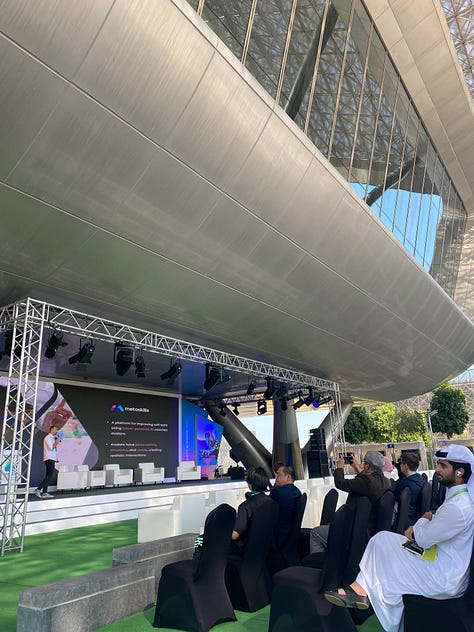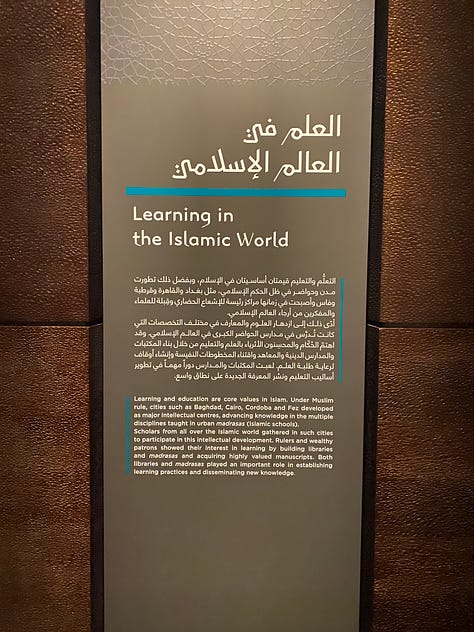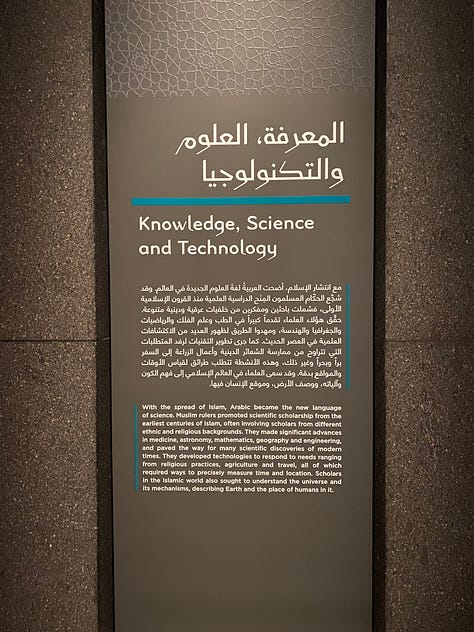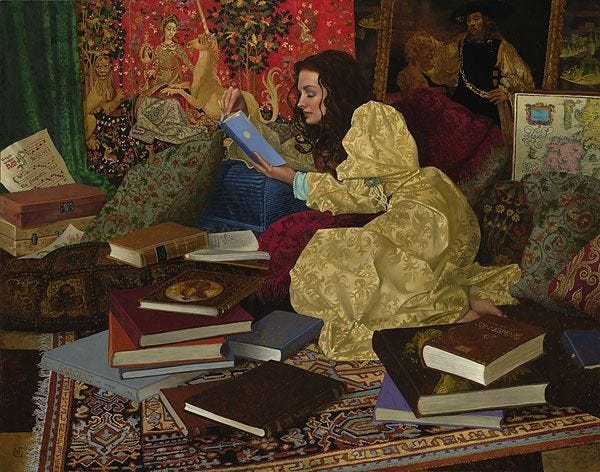AI and the Desecration of Time
'Where Then Are You Going?' On Creation, Convenience, and Consequence
Does God hear the prayer of a machine?
Because it sounds so sincere.
I think this and sit in genuine disbelief, because this is such an absurd conversation to be had that I fear the truth of it will never truly settle in me. I have been unable to process how quickly the world has changed, and the fact that it won’t slow down for my eulogies of what once was and never will be again. Like the rest of humanity, I am forced to accept a new world, whether I like it or not, where men and machines are morphing into a new creature before our eyes.
Is that not a sign of the times? What else could be?
When creation stops looking like creation — when it has convinced itself that it’s the master creator — how else shall the ultimate approach us? Is this reality not the ring of the hour approaching?
The holiness of time and its intrinsically divine place in our being is difficult to encapsulate within the limits of language, precisely because of its magnitude. And yet, in a moment, what we know now as artificial intelligence has stolen it from us. The sacred and profane are not even in a battle any longer, it seems, as one side wears an armor I fear is untouchable.
I write this as I reflect upon the new phenomenon of AI-generated art and writing. As it’s taken over our discourse and doubt, it’s reminded me of how the act of learning is such an inherently holy one. Yet now that too has been reduced to a shadow of what it once was, stripped of its virtuous right as machines now mold it into a thing, not a process, one attainable too easily, and too quickly. There is no page skimming, no effort, no exertion. The mental, emotional, spiritual, and even physical processes we used to have to engage with to learn are now gone, and so too is the authenticity of our learning experience. Nothing can truly ever be the same, and I acknowledge, of course, that there are hopeful and beautiful angles to this as well. I mean not to stretch my cynicism over the truth of potential glory, but only to highlight the nuance.



Late last year, I attended an AI fair at the Qatar Science and Technology Park. It was an exhibition of AI startups and ventures from across the world, devoted to the spirit of fostering innovation. Much can be said about the modern emphasis on innovation as some holy virtue and vital cornerstone of civilization, which inherently neglects the reality that investment in this ‘spirit’ more often than not favors corporate greed and gore, not human progress. Still, the nobility of each intention is to be praised, I will say, as that is how God will judge us. Nevertheless, the tsunami AI’s (public) onset has given rise to, sweeping over the Earth and leaving nothing unsoaked by its waters, has left us with damage in the form of unanswerable questions and a lingering sense of lachrymosity.
Who are we, and what do we do now that there’s no going back?
We have numbed and dumbed ourselves. We are machines worshipping other, more evil machines. Where is the sacred? All we have left is a blue sky losing all its color. Trees we need to breathe are being cut down every day… and not for paper — that’s been replaced!
Every time a single query is put into ChatGPT, an ever-greedy data center gulps nearly a bottle’s worth of water from areas already deeply water-scarce.
Thus, when we confront the idea of there being ‘no ethical consumption under capitalism,’ we’re inevitably brought to a much longer and deeper conversation about the reality of big tech companies and the impact their AI ‘revolution’ is having on us, from our soil to our social structures. Beyond getting into the complexities of such a discussion, I reflect on the simplicity of how our everyday observances have, seemingly in an instant, changed.
In what seems like the blink of an eye, the emotional and mental experience of being on the internet has fundamentally shifted. I am increasingly swept by an internal devastation upon taking in my daily internet dose, thanks to the new and seemingly never-ending assortment of AI-created pieces that I never asked for, and never consented to having to bear witness to.
So many posts, thought pieces, and even personal messages have been so clearly AI-generated that my brain has involuntarily developed an inner dustbin where I place them, not with scorn, but with sorrow. The moment I sense that mechanical touch, the words collapse into mere shapes on a screen, ghosts of what they could’ve been had a soul taken the time to breathe life into them. Forgive my tone, which I know reeks of melodrama, but when it’s so obviously inhuman, I am unable to ignore the corpse of consciousness now in front of me. One could compare this new reality to other famous counterfeits, saying such pieces are like a good fake designer bag, the ones so similar that even the brand itself can’t tell the difference. You’ll say, who cares, right? What’s the harm? It fulfills its function, it holds your weight, and gets you (albeit ridiculously) the praise you so desperately desire. There could be a beautifully worded and thought-provoking piece, and perhaps you’d never be able to tell or even question if it was indeed written by a machine. Where does this argument go then? I speak only of the sadness that we have this conversation at all.
There is something to be said about the cold, brief name of our culprit, too. AI. So short and simple, yet guilty of forcing upon us a series of questions anything but, ones we shall eternally consider. The primary one, of course, being if things are real: if they were made by man or machine. Interestingly, too, I ponder on what these two letters individually represent. A, the first of them all. I, holding the unique position of representing the self. AI. The first self.
But the first self is gone, now. AI killed it.
This brings me back to the truth that there is something unspeakably, unquestionably sacred about the physical, mental, and spiritual energy required to produce something of substance. AI has desecrated that holiness, blurring the lines of something glorious and something profane, and this acknowledgement resurrects the melancholy within me reserved for being an observer of war and this world’s many tragedies.
It can mimic and mirror all it wants, but it will never replicate art, poetry, or any creation in its most sacred form, precisely because it will be missing the holiness of a human hand molding it. Not a hand typing away, but one truly connected through its blood and bone to the mind and spirit that cultivates its creation. One will inevitably argue that rather than stealing time from us, it is the exact opposite — the convenience of AI and its mastery saves or ‘gifts’ us time. This is objectively true in certain regards. I, however, refer to the idea that time spent engaging in something as intrinsically natural to us and our humanity as thinking, learning, and trying, is a unique type of time spent. It is what we were born to do, how we have been meant to pass the minutes and hours. Now that’s been reduced and altered forever.
I am no technophobe, or even entirely a cynic. I like to live according to the saying of the Prophet Muhammad ﷺ:
Naïve and fatigued as it may make me, I like to hold on to the slippery hope that our budding advancements will one day truly help us establish peace, killing only the ever-waging war machine. But there comes a time when such optimism drifts into foolery. I speak as someone who acknowledges, too, that the world is moving at a pace it never quite has before, and you better catch up before it catches you. I know of the beauties it can and shall bring with developments rooted in ethical pursuits and pure intentions. But I fear the damage it’s already done is too weighty, and the truth of what it will continue to produce only sinks us deeper into a sea of inevitable darkness.
This is a deeply complex topic with much to be said on it, but my focus here is on the erosion of effort as a virtue in our lives. It reminds me of one of my favorite verses in the Quran:
You will only receive what you put effort into, God tells us. What does that mean in a world that now praises itself for having removed the need, the desire, to strive?
I feel compelled to reiterate that, of course, I know the usage of AI does not mean one has become a slave to it. The intelligent user will, on the contrary, master it in a way that still honors and perhaps even enhances their natural intellect. At the same time, which is the scenario I truly reflect upon, there’s the phenomenon of students, be they middle schoolers or university seniors, submitting coursework completely drafted by their little machine. I’ve just come across a tweet about a professor caught using AI to grade papers. The irony is baffling. Where is the virtue, then, of the institutions they’re meant to uphold? Of the very idea of pursuing and protecting education? As the daughter and granddaughter of professors so lovingly devoted to their pursuit, I have been raised with a simple belief: the most blessed way one can dance with time is through learning. Seeking knowledge and the time that requires has always been defined as nothing short of beautiful.
I recently attended a dinner (hosted, I must add, in a sublime university library, one that every guest could somehow only mourn, even while standing in its midst) where the great scholar Dr. Khaled Abou el Fadl delivered a speech. He began with a profound remark: “The pursuit of knowledge is always sacred, no matter where it leads us.”
In particular, the usage of the word pursuit is what I speak of here. As the Islamic tradition tells us to “Seek knowledge from the cradle to the grave,” and to “Seek knowledge even if you must go as far as China,” God reminds us of the magnitude of the sanctified nature of the pursuit of learning, and all that it entails.
So then wouldn’t the accessibility that AI tools offer be revolutionary, a blessing, as they allow the layman to embark on this pursuit in a way he previously may not have been able to?
No. Because the learning he will participate in thereafter operates within a fundamentally altered architecture of the mind. Not to mention the obvious and complete loss of integrity of any such production; the more we rely on these machines, the less our brains work as designed. The ever-evolving (for the better) architecture of our minds is what makes us distinct as human beings. Man was never made for the risk of having this fundamental truth so blatantly overthrown by deferring its very purpose elsewhere. When we actively choose to damage our mental and intellectual growth in this manner, so too do we disrupt our spiritual health. Our connection to the Creator is at once demoted, because we have failed to give our intellect the respect it is owed. In outsourcing our efforts and energy, we’ve insulted ourselves; more than that, we have desecrated the earliest sacred truth there ever was: that man lives in this world by using his brain. Such sacrilege can never be revolutionary.
It is a tragic illusion you’ve mistaken for truth. You’ve convinced yourself you’re preserving — bettering — something already healthy. In reality, you’ve been feeding it poison, so your condition deteriorates day by day, neither slowly nor subtly, until before you know it, you lose function completely. You have dried out the very thing you thought you were watering.
God asks us in the Quran: “Where then are you going?”
I wonder, too.




The first thing I want to say is that you have a distinct writing style that is thoroughly enjoyable to read. The second is that everything you said resonated deeply: there is something seriously wrong with how we interact with technology. I've spent the past few weeks marking 100+ undergrad essays, and the prevalence of AI-generated essays was mind-blowing (and incredibly deflating as an educator).
But the problem goes beyond tertiary education, or education in schools for that matter. And I don't know what the solution is.
Your article was deeply thoughtful and beautifully written. The way you highlighted the sacredness and perseverance of knowledge truly touched me.
What you’ve spoken about—the holiness in the pursuit of ‘ilm—is something we must stay connected to. AI may assist us, but it should never replace the reverence, intention, and depth that come with seeking knowledge as an act of ibadah.
Thank you for the reminder to stay rooted in what’s sacred.